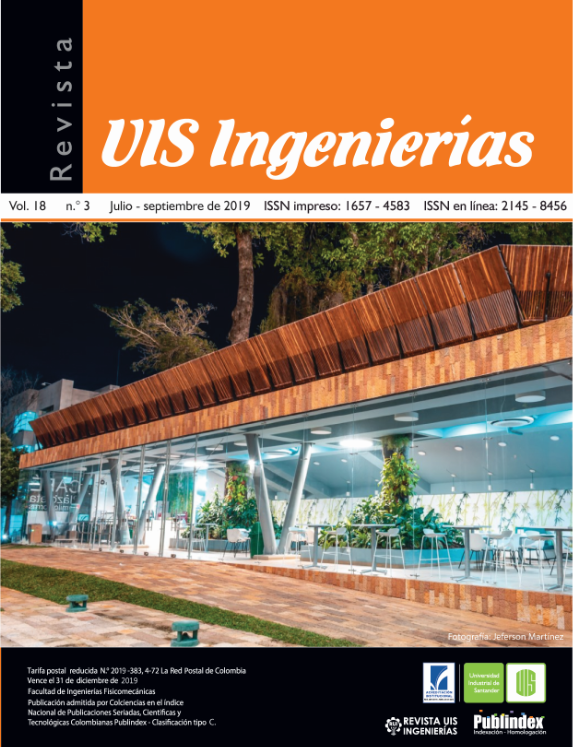Rotomolding machine design based on gyroscope principle
Published 2019-04-29
Keywords
- rotomolding,
- gyroscope,
- machine design,
- imitation marble
How to Cite
Abstract
The design of a gyroscope-based machine for imitation marble rotomolding is presented. The main feature of the proposed model is the capability of independent rotational motion for each axis. The rotational speeds were set from documented experimental reports. Dynamic equations were used to establish the torque expressions according to the mass and shape (inertia) on the rotatory elements. A Matlab program was created to evaluate the safety factors of the main components that are commercially available in the local market. Parametric design capability of DriveWorkXpress was used to create a CAD model in SolidWorks to perform finite element analysis to verify results and generate the machine blueprints. The proposed methodology was illustrated with an ornamental imitation marble piece of 0.9x0.9x0.6m dimensions.
Downloads
References
[2] Mariano, “Rotomoldeo II | Tecnología de los Plásticos,” blogspot, 2011. [En línea]. Disponible en: http://tecnologiadelosplasticos.blogspot.com/2011/12/rotomoldeo-ii.html
[3] J. L. Rakes, R. L. Rees, and E. C. Held Jr, “Method of rotational molding,” US 3474165A, 15-Sep-1966.
[4] N. Henwood and C. García, “Cómo mantener la calidad de los productos en proceso de manufactura por rotomoldeo,” Tecnología del plástico, 2008. [En línea]. Disponible en: http://www.plastico.com/temas/Como-mantener-la-calidad-de-los-productos-en-proceso-de-manufactura-por-rotomoldeo+3062210?pagina=1
[5] G. Beall, Rotational Molding: Design, Materials, Tooling, and Processing. Hanser Publishers, 1998.
[6] Y. Satoh, H. Tsuchihashi, and S. Tani, “Rotational molding apparatus having robot to open, close, charge and clean molds,” US4629409A, 27-Jun-1985 [En línea]. Disponible en: https://patents.google.com/patent/US4629409
[7] Y. Wang, K. Zhang, Y. C. Dai, J. Liu, and Y. Y. Zhang, “State-of-the-Art of Rotational Moulding Technique and its Application,” Appl. Mech. Mater., vol. 80–81, pp. 980–984, 2011. doi: 10.4028/www.scientific.net/AMM.80-81.980.
[8] L. Payne, “Multiaxis rotational molding apparatus and method,” US6511619B1, 30-Apr-1999 [En línea]. Disponible en: https://patents.google.com/patent/US6511619
[9] L. Payne, “Multiaxis rotational molding apparatus,” U.S. Patent 5188845A, 23-Feb-1993 [En línea]. Disponible en: https://patents.google.com/patent/US5188845A/en
[10] T. Jachowicz and J. W. Sikora, “Investigation Of The Influence Of Mold Rotational Speed On The Cast Wall Thickness In The Rotational Molding Process,” Adv. Sci. Technol. Res. J., vol. 7, no. 19, pp. 79–87, 2013. doi: 10.5604/20804075.1062380.
[11] R. C. Hibbeler, Engineering mechanics. Dynamics, 14th ed. Pearson, 2016.
[12] R. Budynas and K. Nisbett, Shigley’s Mechanical Engineering Design, 10th ed. McGraw-Hill, 2015.
[13] Lincoln Electric, “AWS Classification Explained,” 2016. [En línea]. Disponible en: https://www.lincolnelectric.com/en-gb/support/process-and-theory/Pages/aws-classifications-detail.aspx
[14] SKF, “SKF Bearing Calculator | Engineering Tools,” 2017. [En línea]. Disponible en: http://www.skf.com/ve/knowledge-centre/engineering-tools/skfbearingcalculator.html
[15] SKF, “Acoplamientos de eje flexibles,” 2015. [En línea]. Disponible en: http://www.skf.com/ve/products/coupling-systems/flexible-shaft-couplings/index.html
[16] Steckerl Aceros, “Steckerl Aceros - Experiencia y servicio con calidad de acero,” 2010. [En línea]. Disponible en: http://steckerlaceros.com/catalogo/index.html
[17] Moog, “AC4598-10 Amp Per Circuit 1-1/2 Inch Through Bore Slip Ring,” 2015. [En línea]. Disponible en: http://www.moog.com/products/slip-rings/commercial-industrial-slip-rings/slip-rings-with-through-bores/ac4598/
[18] Lincoln Electric Company, “Welding and Cutting Equipment Catalog 2019.” 2019. [En línea]. Disponible en: https://www.lincolnelectric.com/assets/US/EN/literature/e110.pdf


